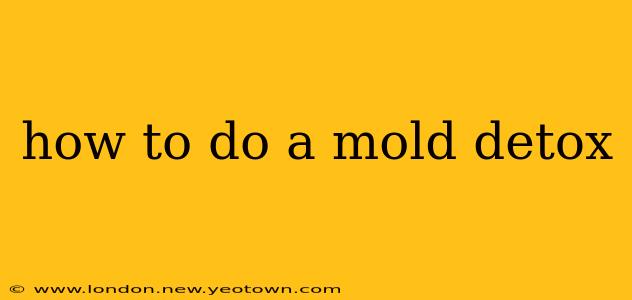How to Do a Mold Detox: A Holistic Approach to Removing Toxins
Mold exposure can significantly impact your health, leading to a range of symptoms from mild allergies to severe respiratory issues. While professional mold remediation is crucial for addressing the source of the problem, a holistic approach including a "mold detox" can help support your body's natural detoxification processes and alleviate symptoms. This isn't a quick fix, but a journey towards better health. Remember, this information is for educational purposes only, and should not be considered medical advice. Always consult with your doctor before starting any new health regimen, especially if you have pre-existing conditions.
What is a Mold Detox?
A mold detox isn't a single treatment, but rather a multifaceted strategy aimed at supporting your body's natural detoxification systems. It involves a combination of dietary changes, lifestyle adjustments, and potentially supplemental support to help your liver, kidneys, and lymphatic system efficiently eliminate mold toxins (mycotoxins) from your system.
What are the Symptoms of Mold Exposure?
Recognizing the signs is the first step. Many symptoms mimic other illnesses, making diagnosis tricky. Common symptoms include:
- Respiratory issues: Cough, wheezing, shortness of breath, asthma exacerbation.
- Allergic reactions: Runny nose, sneezing, itchy eyes, skin rashes.
- Neurological symptoms: Headaches, brain fog, dizziness, fatigue, memory problems.
- Gastrointestinal problems: Nausea, vomiting, diarrhea, abdominal pain.
- Other symptoms: Muscle aches, joint pain, fever.
If you suspect mold exposure, seeking professional medical evaluation is crucial for accurate diagnosis and treatment.
How to Support Your Body's Natural Detoxification Processes?
This is where the "mold detox" strategies come in. It's about optimizing your body's inherent ability to cleanse itself.
1. Dietary Changes: Nourishing Your Body for Detox
- Focus on nutrient-dense foods: Prioritize whole, unprocessed foods like fruits, vegetables, lean proteins, and whole grains. These provide the building blocks your body needs for detoxification.
- Hydration is key: Drink plenty of pure water throughout the day to flush out toxins.
- Limit processed foods, sugar, and alcohol: These can overburden your liver and hinder detoxification processes.
- Consider a detoxifying diet: Specific diets like the anti-inflammatory diet or a low-toxin diet can be beneficial, but always consult a healthcare professional or registered dietitian before making significant changes.
2. Lifestyle Adjustments: Supporting Your System
- Prioritize sleep: Adequate sleep is crucial for cellular repair and detoxification.
- Manage stress: Stress can negatively impact detoxification processes. Explore stress-reducing techniques like yoga, meditation, or spending time in nature.
- Regular exercise: Physical activity supports lymphatic drainage and overall detoxification.
- Sauna use (with caution): Some people find that regular sauna use helps to sweat out toxins, but it's important to stay hydrated and listen to your body. Consult your doctor before using a sauna, especially if you have heart conditions.
3. Supplements to Consider (Consult Your Doctor First)
- Activated charcoal: May help bind to mycotoxins in the gut and aid their elimination.
- Chlorella: A type of algae believed to support detoxification.
- NAC (N-acetylcysteine): An antioxidant that supports liver health.
- B vitamins: Essential for energy production and detoxification.
Disclaimer: While these supplements may offer support, they are not a replacement for professional mold remediation and medical advice. The effectiveness of these supplements varies, and their use should always be discussed with your doctor.
How Long Does a Mold Detox Take?
The duration of a mold detox varies depending on the severity of exposure, individual health, and the effectiveness of the remediation efforts. It's a process, not a quick fix. Consistent effort over several weeks or months is typically necessary.
Can You Detox from Mold on Your Own?
While you can certainly take steps to support your body's detoxification processes, it's crucial to address the underlying cause—the mold itself. Professional mold remediation is essential. A "mold detox" should be considered a complementary approach, not a sole solution.
What if I Still Feel Sick After a Mold Detox?
If symptoms persist despite your efforts, it's crucial to consult a healthcare professional. There could be other underlying health conditions or unresolved mold issues. Thorough testing and medical evaluation are critical in such cases.
This journey towards a healthier life after mold exposure requires patience, consistency, and a holistic approach. Remember that seeking professional help, both in terms of mold remediation and medical advice, is paramount for effective and safe recovery.

